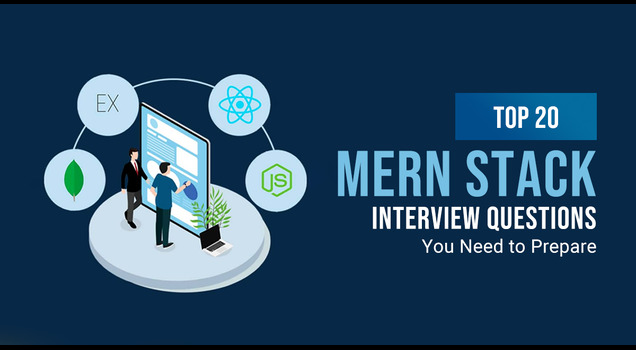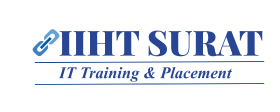Top 20 MERN Stack Interview Questions You Need to Prepare

Table of Contents
ToggleIntroduction
The MERN stack is among the most widely used web development technology stacks in today’s applications. It consists of MongoDB, Express.js, React, and Node.js, each of which plays a crucial role in the development of dynamic full-stack applications. So, if you are aiming to become a full-stack developer, mastering the MERN stack through a MERN Stack Course in Surat can be a significant step forward.
This blog has been designed for students who attend an interview at IIHT Surat. They can crack their interviews with crystal clarity regarding MERN stack interview questions. We will cover some essential questions and concepts to give you a running start.

Section 1: Understanding the MERN Stack
Let’s break down each part of the MERN stack:
- MongoDB: A NoSQL database that stores data flexibly, document-oriented. Great for handling large amounts of data.
- js: This is a web framework for Node.js, and it makes routing easier to handle and request management.
- React: Famous JavaScript library for user interface: React draws attention to reusing components for fluid front-end development.
- js: This JavaScript runtime provides a client-side environment for implementing server-side codes and can take JavaScript to the back-end.
Using the MERN stack basically keeps things pretty easy for developers and businesses alike. It’s very easy to develop, scales, and keeps everything in one language—JavaScript!
Also Read: Top Full Stack Developer Interview Questions
Section 2: Core Interview Questions
What is the MERN stack?
The MERN stack consists of the MongoDB, Express.js, React, and Node.js. With each tool involved in full-stack development.
How does MongoDB differ from SQL databases?
MongoDB is document-oriented. It’s easier and more scalable than SQL. It deals more easily with unstructured data.
In what ways does Express.js support web development?
Express makes things easier. It comes with built-in routers, middleware management, and request handling capabilities that facilitate faster building of web applications.
What are the main features of React?
React is popular for its support of components, virtual DOM, and one-way data binding to aid responsive user interfaces.
Why does Node.js enjoy so much popularity in server-side application development?
This event-driven nature makes Node.js work with numerous requests without slowing the process down. At the same time, it is non-blocking, which means it is efficient.
Section 3: MongoDB Specific Questions
What does a MongoDB document represent?
Documents: JSON-like objects that hold data. They can very easily hold plenty of data in complex fields as well.
How do you read, write, and delete on MongoDB?
CRUD represents Create, Read, Update, and Delete. These are the primary actions for MongoDB data management.
What are indexes in MongoDB, and why are they important?
Indexes speed up searches—to make data retrieval faster and more efficient.
How do you handle relationships in the data of MongoDB?
You either store the related data itself or a reference to the related data. That is embedding versus referencing.
Chapter 4: General Express.js Questions
What is middleware in Express.js?
Middleware functions are small helper functions used with Express that assist with routing and managing requests.
How do you handle routes in an Express application?
Routes can be handy in handling multiple requests to your application. You could add routes for different actions, such as fetching information about users.
Which of the following security practices do you add to an Express application?
The important practices include CORS, validation of inputs, and allowing authentication to safeguard your data
Chapter 5: React-Specific Questions
What’s the difference between class components and functional components?
Class-based components depend on lifecycle methods, whereas for functional components, you have things like useState and useEffect.
How do you manage state in React?
You can manage the state locally within a component or leverage the Context API or Redux for larger applications.
What are React hooks, and why are they useful?
You’ve got useState and useEffect for example, which really let the functional component not be as confusing but so much more powerful without needing to use classes.
Chapter 6: Node.js-Specific Questions
How do you deal with asynchronous programming in Node.js?
Node.js uses callbacks, promises, and async/await to handle asynchronous operations efficiently.
What is npm, and why is it important?
npm is the package manager for Node.js. It allows you to manage libraries and dependencies in your project.
Chapter 7: Full-Stack Development Questions
How would you implement authentication in a MERN app?
You can use JWTs, sessions, or OAuth to secure data related to the user or manage access.
What are some deployment options for MERN apps?
Some popular choices are Heroku, AWS, and Docker-which all offer ways to host and scale your application.
Chapter 8: Advanced Topics
How do I optimize the performance of a MERN app?
You may optimize both client and server-side performance by using caching, optimizing queries, and minimizing the load time for your app.

Conclusion
- MERN stack skills required: The MERN stack can open a whole lot of doors in terms of web development jobs.
- Practice makes perfect: Go through questions and try to answer them on your own
- Hands-on is the best: Build small projects or contribute to open source applying what you have learned.
- Core concepts: Having deep knowledge of MongoDB, Express, React, and Node is a plus.
- Be prepared with answers to general questions, as most interviews test the practical use of MERN concepts in real life.
- Develop a problem-solving approach: The way you solve problems often is as important as your technical knowledge.
- Keep yourself updated on the latest developments: The technology field changes fast; keep learning and exploring new trends in MERN Stack.
- Connect with others: Discuss your experience, seek feedback from others, and learn from more experienced developers.
- Build confidence in the interviews: the more you practice, the better you will be, and the comfort and confidence you will have during the interview.

